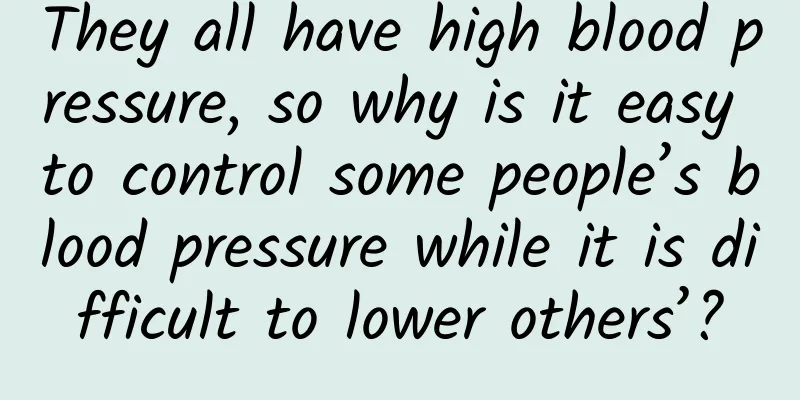They all have high blood pressure, so why is it easy to control some people’s blood pressure while it is difficult to lower others’?

|
A friend who suffers from high blood pressure complained to Huazi. One of his friends also had high blood pressure. After taking a blood pressure-lowering drug, his blood pressure came down quickly. However, he himself took two or three blood pressure-lowering drugs, but his blood pressure was still not ideal. The high blood pressure was under control, but the low blood pressure was still above the standard. Why is it so difficult to lower his blood pressure when he also has high blood pressure? Hua Zi said that for the treatment of hypertension, an important step is to conduct a comprehensive analysis, including height, weight, age, lifestyle, and family history, to try to find the cause of hypertension. Then, according to the damage to the target organ, appropriate antihypertensive drugs are selected, and it is likely that a long period of drug adjustment will be required. 1. What kind of high blood pressure is easy to reduce Hypertension that is easy to control is generally primary hypertension for which no specific cause can be found. It is the first onset of hypertension or the long-term medication that can be taken as prescribed by the doctor. The blood pressure has been well controlled, and there is no serious damage to important organs such as the heart, brain, kidneys, eyes, and blood vessels, and the blood lipids and blood sugar are relatively stable. And while taking the medicine, you can also maintain a healthy lifestyle, such as controlling salt intake, maintaining a standard weight, and exercising regularly. In fact, it is not difficult to control primary hypertension. As long as you take medication regularly and live a healthy life, it can basically be well controlled. 2. What kind of blood pressure is not easy to lower? 1. Secondary hypertension: Hypertension caused by other diseases is called secondary hypertension. Common causes are kidney diseases, such as renal cortical hyperplasia, renal artery stenosis, kidney tumors, etc.; or hypertension and diabetes causing kidney damage, which will cause abnormalities in the "renin-angiotensin-aldosterone" system (RAAS), leading to abnormally high blood pressure. Even with a large amount of antihypertensive drugs, it is difficult to control blood pressure. Hyperthyroidism, pheochromocytoma, Cushing's syndrome and other diseases can also cause abnormally high blood pressure. For the treatment of secondary hypertension, antihypertensive drugs have limited effect. They are mainly used to treat the primary disease. After the cause is eliminated, hypertension can even be completely cured. 2. Hypertension caused by emotions: There are no other diseases, but due to the influence of negative emotions, the sympathetic nerves are overexcited, which can also cause high blood pressure. For example, if you encounter greater pressure in life, work, and emotions, or have anxiety, depression, severe lack of sleep, etc., it will cause high blood pressure. In this case, psychological treatment is needed. After eliminating negative emotions, blood pressure will drop. There is also a type of "white coat hypertension", where the patient's blood pressure is elevated when measured in the hospital clinic, but normal when measured at home or through 24-hour dynamic blood pressure monitoring. This is because the patient is overly nervous in the hospital, causing the blood pressure to rise. Therefore, when measuring blood pressure, self-measurement at home is more accurate. 3. Irrational use of antihypertensive drugs: Many hypertensive patients do not receive standardized treatment, but use drugs on their own, which leads to failure in lowering blood pressure due to irrational use of drugs. 70% of hypertensive patients need to take two or more combined drugs to effectively control blood pressure. For example, elderly patients with hypertension usually need to use diuretics as a basis, and then use other antihypertensive drugs to control blood pressure. Young patients with hypertension usually need to choose loral or sartan drugs as a basic medication based on their resting heart rate. How to choose a combination of drugs is a complicated matter. It requires various examinations to exclude contraindications to medication, and to choose the antihypertensive drug with the strongest protective effect according to the damage to the target organ. Self-medication can easily lead to irrational medication or even medication errors. In summary, the human body's blood pressure is affected by various organ conditions and nerve functions, and it is not easy to control high blood pressure. If you suffer from high blood pressure, you need to undergo a detailed examination to rule out secondary hypertension, use medication under the guidance of a doctor, and follow the doctor's advice to take medication regularly in order to control blood pressure and avoid organ damage. Don’t take medication on your own or adjust the dosage without authorization. If you have any questions about medication, consult a doctor or pharmacist. I am pharmacist Huazi, welcome to follow me and share more health knowledge. |
<<: Effectively reducing disability after stroke - early rehabilitation
>>: Can't eat anything if you have diabetes? Beware of malnutrition!
Recommend
Advantages of laparoscopic treatment of ectopic pregnancy
For women, ectopic pregnancy is a relatively dang...
Health and disease prevention tips for December
Health and disease prevention tips for December T...
Can I have sex at 29 weeks of pregnancy?
After pregnancy, women usually have stronger sexu...
How much is a cup of Heytea Zhizhi Ganpu? Where can I buy it? Is Heytea Zhizhi Ganpu delicious? How does it taste?
We all know that Heytea is a common milk tea shop...
What to do if the fresh embryo is 10 days old?
In vitro fertilization has now become a preferred...
Can postpartum breast shriveling and sagging be restored?
After giving birth, women's originally plump ...
What are the differences between breast nodules and breast hyperplasia?
Many women want to know about breast nodules and ...
What should you pay attention to before and after tooth extraction? Just remember these points sorted out by the dentist~
There is a thing It is called a bug in the histor...
Who should undergo cervical cancer screening?
Cervical cancer screening is a method that can ef...
How to do a biopsy of vulvar leukoplakia?
Some female friends will be nervous when they fin...
Is it harmful to your health? Put away your curiosity and stay away from e-cigarettes
In recent years, the global e-cigarette market ha...
At what age does female armpit odor disappear?
I don't know if you have noticed that body od...
What happens if you eat too many cucumbers? Just look at this and you will understand
Cucumber is a very common fruit and vegetable in ...
How to quickly catch wheat ears when fishing in the wild and how to make the wheat ears delicious
The name of the wheatear fish varies in different...
How to remove spots on a woman's face
The most important thing in removing pigmentation...









